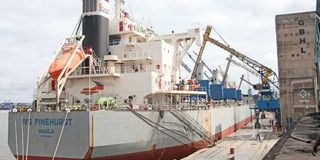The reality of ‘sea blindness’ at a time maritime is indispensable

‘Mv IVS Pinehurst’ offloads maize at the Port of Mombasa on May 15, 2017.PHOTO | FILE | NATION MEDIA GROUP
What you need to know:
- Maritime business being one of the most excluded modern activities, it doesn’t trigger curiosity, hence missing recognition for what it is worth.
Those who have been to Kenya’s second-largest city, Mombasa, must contend that one of the most protected facilities is the port.
Secured behind high barbed walls and layered security checks is the important terminus where 80 per cent of Kenya’s household goods are received and our treasured agricultural commodities leave for foreign markets.
But as ships become bigger, their place in our imagination has shrunk, obscuring the critical role of shipping in our lives — a trend that has earned the name “sea blindness” in the maritime world.
Rarely do we question the ‘hidden forces’ behind enabling a container full of motor vehicles or imported wheat reach a port. Maritime business being one of the most excluded modern activities, it doesn’t trigger curiosity, hence missing recognition for what it is worth.
CONTAINER SHIPPING FIRM
That is why Maersk, the biggest container shipping firm, is invisible to many yet its $38.8 billion annual revenue is double Netflix’s. Yet the TV set that most households use to stream Netflix films was shipped by Maersk!
Tom Bergin, an investigative journalist with Reuters, in his epic expose The Greek Shipping Myth recounts an incident underpinning the secrecy that rules the Union of Greek Ship Owners.
It is said that in June 2012, after Kostis Moussouroulis became Shipping minister in Greece, he received a visit from a 90-year-old shipowner who told him: “Don’t forget, the best minister of shipping and maritime affairs is the one doing nothing for the industry.
He is the one who leaves us alone.” In fact, the total membership of the union is not known, besides it running the biggest merchant fleets. This speaks of one of the unwritten maritime rules: What happens at sea stays at sea.
For this reason, the ordeals of seafarers in the deep sea never reach the land. The torture that they go through in bringing us the essentials we need rarely gets to hit the headlines.
RANSOM
When 33 men got trapped in a mine in the Atacama Desert, Chile, in 2010, more than 2,000 journalists were live on location to cover the tragedy. But what about the more than 170 seafarers being held by Somali pirates for ransom?
It is in recognition of the central role of seafarers in our lives that, every June 25, we celebrate their heroism thriugh the International Seafarers Day. At a time when the world is reeling under the heat of a global pandemic, thanks to them, countries in need of critical ICU beds and medicines import them.
Movement restrictions hinder crew changes for most ships, hence physical and mental torture for seafarers who have been away from their families for even a year. Governments should facilitate their repatriation and, most importantly, recognise them as an essential service.
Every time you watch TV or adorn your highly treasured garment, remember the seafarer behind the scenes, clocking 180-200 overtime hours per month to ship your order in time, far beyond the threshold of working hours in a civilised society.
Brian Gicheru Kinyua, maritime and shipping enthusiast. [email protected]




